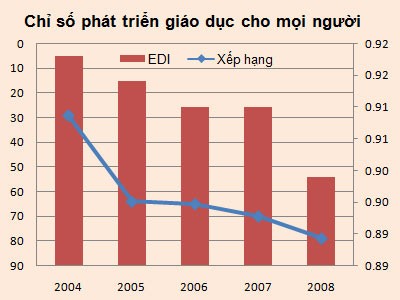(VOV) – A major topic at the just-concluded sixth plenum of the Party Central Committee was fundamental and comprehensive reform of the country’s education and training sector. Why do we need reform? Does our education and training sector need to be overhauled right now? Does reform mean rejecting the sector’s achievements so far? And what should the reform look like? These questions need to be discussed in depth and answered. And they happen to be the main points of an article by journalist Vu Hai, National Assembly deputy, and VOV’s Deputy Director General.
 |
| UNESCO’s assessment: the left column reveals Vietnam’s ranking while the right hand column is the parameters Vietnam has in the Educational Development Index, EDI. (Photo: hp-aptech.edu.vn) |
Vietnam’s renewal process has brought about many important achievements that have changed the face of the country and elevated its status in the international arena. These achievements have been acknowledged not only by the Vietnamese people but also by friends around the world. Vietnam’s successes in education and training are a source of pride but weaknesses leave the sector short of society’s needs.
This is not the first time the Vietnamese Party and Government have determined to reform education and training. Since it was founded in September, 1945, Vietnam has reformed the sector four times - in 1950, 1956, 1979, and particularly in 1986, when education and training was considered part of the country’s fundamental and comprehensive renewal process. But prior to this reform, Vietnam needs to make a thorough assessment of the sector’s real situation, its achievements, limitations, and objective and subjective reasons from which to set out an overall goal and an implementation roadmap.
Do we lack policies to support an essential and comprehensive reform of education and training? The answer is no. We already have the statement of the Party Central Committee’s sixth plenum, the Party resolution of the 8th Party Central Committee, and the announcement of the Poliburo in 2009, all of which remain valid. In addition, we have the Party and State’s habit of considering education a national priority. Investment in education and training is an investment in the country’s development. Education and training serves the cause of the Party, the Government, and the people.
What should we do for this education and training reform? First, the reform should be conducted systematically, synchronously, and scientifically. It should follow an appropriate roadmap, be of inheritance, and development. Reforms should be made in the curricula for pre-schools, general schools, vocational, and tertiary education. Some experts say that the current 12-grade general education is too heavy and wasteful. Some have proposed that general education should last for only 10 years as in the past - or even nine years - and then pupils can elect to continue study. The content of education should be modified to focus on things society needs.
A fundamental and comprehensive reform of education and training should give higher priority to useful knowledge, personal development, and developing practical skills. Reform should change education from a passive to a proactive form and teach students know how to solve a variety of practical problems. Fundamental and comprehensive reform means new policies for teachers and educational staff, a new mechanism for education administration, a higher quality of scientific research, and a new mechanism to finance the sector’s construction of infrastructure. The reform should be closely linked to Vietnam’s socio-economic development strategy and to national security and defense.
To conclude, the aim of fundamental and comprehensive reform is to create favorable conditions for learners in Vietnam to take the initiative to develop in proportion to their ability and aspirations.
Vu Hai